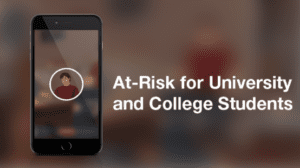Breaking Down Barriers: Supporting Marginalized Students in 2021
The impact of the COVID-19 pandemic, racial injustice, and social unrest are disproportionately felt by marginalized students. These communities are more vulnerable in emergencies, and higher education institutions need to support them appropriately to ensure no one is overlooked. We recently hosted a roundtable discussion with psychologists, mental health experts, and a college student in order to better understand how campuses can better support these communities in 2021 and beyond. Here’s a summary of what they had to say.
Understanding What Students Are Experiencing
Students are experiencing grief from a variety of environmental conditions as a result of the COVID-19 pandemic. Seniors are experiencing the loss of graduation traditions. First-year students are experiencing the loss of social development. And all students are experiencing the loss of social groups and on-campus support systems.

“We’re grieving in the fact that we’re losing our experiences,” said Veronica Mixon, a senior student and president of the African American Studies Org at the University of Alabama at Birmingham. “We can’t meet anymore unless it’s over Zoom and students are Zoomed out and tired of having to be online … and we’re still trying to manage the hat of a student while we manage our own mental health, while we manage social media trauma with racial injustices and things of that nature.”
Students are carrying a lot, inside and outside of their campus life. They are whole people with complicated lives and are trying to cope with loss, survive a pandemic, and be a successful student … all during a time when they are growing to understand who they are as people. It’s a lot to carry, and everyone is carrying a different load.
Compounding Traumas
One point that was repeated throughout the webinar is that students are not just students—they are people with varied backgrounds and lives outside of the university. The political and social issues marginalized students face only compound the pressures placed on them during the pandemic.
Barry Schreier, Ph.D., Director, University Counseling Service and Professor of Counseling Psychology at the University of Iowa explains that these “compounding” traumas are like links in a chain. The more links students pick up, the heavier that chain gets until it is too heavy to carry. When students appear to be struggling, he stresses the importance of reframing the thought of “What’s wrong with that student?” to instead ask, “I wonder what’s happened to that student?”
There could be a variety of compounding traumas—little t traumas and big T traumas—that marginalized students are carrying on their chain related to their race, ethnicity, sexual orientation, gender identity, socioeconomic standing, first-generation standing, whether they’re international, etc. Being compassionate and seeking to understand these experiences can go a long way in helping students feel supported.
How to Better Support Marginalized Students
There is no “one size fits all” way to support students. Mary Chandler Bolin, Ph.D., Director, Consultation and Psychological Services, University of Kentucky, says that trying to better understand individual student needs is key, and to seek ways both inside and outside the institution to help them not only in that moment, but also into the future.
Some specific examples of actions to support marginalized students that were shared during the webinar include:
- Adjusting norms and expectations to meet the challenges posed by the pandemic
- Providing financial assistance (rent, food, basic needs)
- Offering employment assistance – particularly for international students who are not allowed by visa status to work off campus
- Creating support groups for specific marginalized communities
- Training faculty to better engage with and support students
- Increasing communication and access to resources
- Being mindful of which students are referred off campus for services
There is no tried-and-true plan for campuses to follow in response to the pandemic. We are all sharing this experience together, but the context of that experience changes depending on a person’s identity and background. Students who belong to marginalized communities are experiencing greater challenges, and it’s important to listen to them to understand how to best validate them and support them during this critical time.
The job of validating and supporting marginalized students does not just fall on mental health professionals. All faculty and staff members have a role to play, which is why giving them appropriate training opportunities can help them better meet their students’ needs.
In Mixon’s college career, she’s seen students reach out more to both fellow peers and to professors. “Students never really felt comfortable talking to professors as much as they do now because I think now everyone understands that we’re all in this together,” she said. “I think now moving forward, there’s going to be more opportunities for support because there’s more conversations that people are having with these students.”
For more insights, watch the one-hour webinar recording and access the presentation slides here.